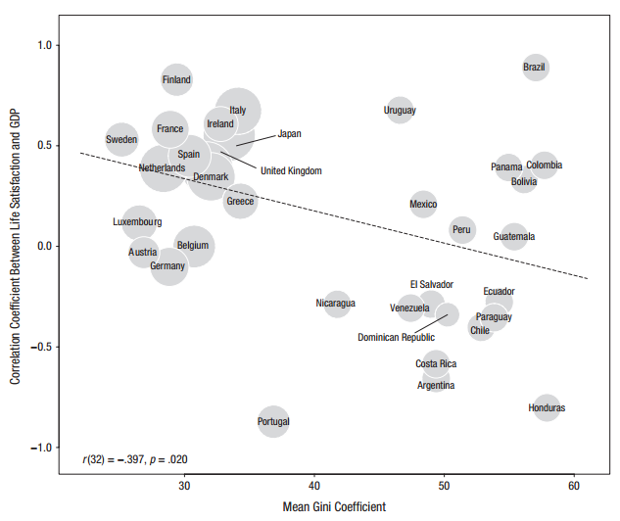The Easterlin Paradox
Many can agree that people's incomes relates to their happiness. When we have more money, we feel financially stable and may even have the luxury to buy other goods that will make us happier, such as accessories, video games, or a buffet dinner. This can cause people to believe that all richer, developed countries will have a significantly higher happiness level than poorer countries. However, this is not true due to the Easterlin Paradox. Economist Richard Easterlin discovered in 1974 that economic development does not correlate with an increase in national happiness.
Recent studies have shown that income inequality could be a factor in why this phenomenon occurs. Inequality within a nation have been proved to indicate unfairness and loss of trust between the people. Additionally, it leads to more economic opportunities for the upper class and a harder living environment for the lower class, such as higher levels of crime. For these studies, the researchers investigated two groups of countries: one group consisting of developed nations and the other consisting of Latin American countries.
Using GDP data and the Gini coefficient (standard measure of inequality), the analysts found that for the first group, when the inequality was high, economic growth or increase in GDP had no effect on the happiness of people. Happiness was essentially "inversely related to income inequality". However, for the Latin American nations, economic growth actually related to a slight decrease in national happiness. The income inequality is still high in these regions, so it was definitely a main factor in determining a lower level of life satisfaction, but economic development did not positively affect happiness.
This Easterlin Paradox indicates that we should focus on distributing the wealth in all nations, rather than focusing on economic advances. We as individuals might feel happy with an increase in income, but to heighten the level of happiness within a nation, we must work together to fix the income distribution.
Sources



This is something we talk a lot about in positive psychology! In addition to the Easterlin Paradox there are many other authors and "fathers of positive psychology" than agree with the fact that your annual income does not in fact correlate with your happiness levels! In fact, once your income has reached 75,000 there is no difference in it's ability to make you happy than if you were to be making $100,000 a year. It's about what you choose to do with your life outside of your job as well as what you choose to contribute to the world.
ReplyDeleteInteresting post, Kevin! I think we always assume that having more money and wealth will make us happy, but the Easterlin Paradox really disputes that assumption. I think there's an extent to which money can make us happy, where as long as we have enough to spend on the bare necessities (clothes, housing, food) and a bit on things that make us satisfied (luxury foods and goods, entertainment), we feel a degree of happiness. However, having too much wealth is also a contributor to declined rates of happiness as embodied by certain lottery winners who blow through their millions and end up worse off than they started. While most lottery winners see increased satisfaction with their overall life trajectory, they don't see improvements in how they feel on a day-to-day basis.
ReplyDeleteSource: https://www.marketwatch.com/story/does-winning-the-lottery-make-you-happier-2018-06-04
I find the paradox of wealth and happiness to be really interesting, and I've read somewhere that past a certain wealth threshold, income and happiness are not correlated at all. The Easterlin Paradox seems to confirm this, although I do think there's a resolution. Early stages of industialisation do tend to breed inequality and poor standards of living (see England c. 1800s and modern China) despite having quick growth. Perhaps unhappiness and inequality are both tied to national stages of growth?
ReplyDelete